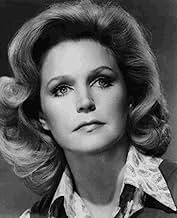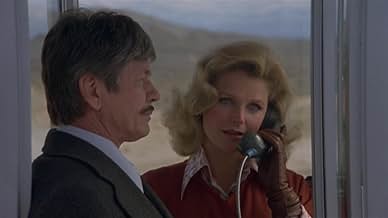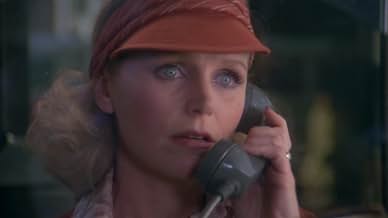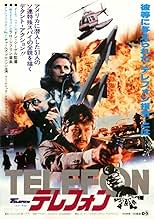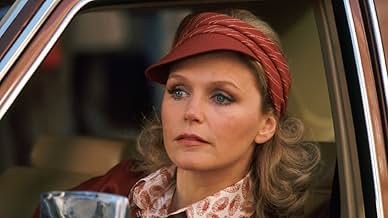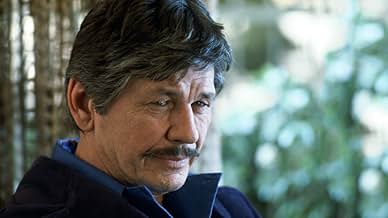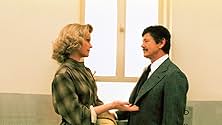AVALIAÇÃO DA IMDb
6,5/10
6,6 mil
SUA AVALIAÇÃO
Um oficial russo é enviado aos Estados Unidos para tentar impedir que agentes adormecidos ataquem sem pensar entidades governamentais ao ouvirem certas palavras em código.Um oficial russo é enviado aos Estados Unidos para tentar impedir que agentes adormecidos ataquem sem pensar entidades governamentais ao ouvirem certas palavras em código.Um oficial russo é enviado aos Estados Unidos para tentar impedir que agentes adormecidos ataquem sem pensar entidades governamentais ao ouvirem certas palavras em código.
- Direção
- Roteiristas
- Artistas
- Prêmios
- 1 indicação no total
Regis Cordic
- Doctor
- (as Regis J. Cordic)
Avaliações em destaque
Riveting political thriller. Bronson plays a Russian intelligence major assigned to stop programmed Stalinist agents from carrying out a possible doomsday plan. Bronson's a member of a reformist wing of the Soviet Communist Party that has replaced hardline Stalinists. However, the earlier doomsday plan remains in effect, and now it's being executed in the US by a renegade Soviet agent (Pleasance). Fortunately for Bronson, the winsome Remick is assigned by Soviets to assist him. Problem is if Pleasance is not stopped he could well set off a nuclear catastrophe.
The movie has two elements from earlier Cold War films: The Manchurian Candidate (1962) and Dr. Strangelove (1964). Like Laurence Harvey in the former, agents here are programmed by trigger words to carry out their mission in robotic fashion. At the same time, there's the overhang of a possible doomsday as in Strangelove. Here those elements are skillfully blended to build suspense.
What really distinguishes the film, however, is an overall absence of Cold War good guys and bad guys. There's really only one villain, the unreformed Stalinist. Unlike 50's Cold War films, this one treats operatives of both sides strictly as professionals doing their duty without noticeable favorites. One possible exception is Remick. Despite her coy girlish manner, she's also been assigned to eliminate partner Bronson once he succeeds in killing Pleasance. That way, no one will be left to spill the beans about the aborted plan and embarrass the new Soviet regime. So Bronson is to be rewarded by his superiors with death. Maybe that's a good enough reason, but not unarguably so.
Meanwhile, Bronson's his usual steely self, while Remick plays up the girlish appearance, leaving us to guess how much of a façade it is. But stealing the show is Tyne Daly as the plain-looking brain behind the American side. Her superiors appear rather addled much of the time, while she deftly maneuvers clues behind her bank of computers. Good touch. Most of the action comes from explosions that blow up real good. I don't know how they did them in 1977, but they're impressive as heck.
Anyway, the movie suggests a possible waning of Cold War passions on our side, perhaps because of growing recognition of what a nuclear exchange would entail. Be that as it may, the movie remains a taut and under-rated political thriller, helmed by the masterful Don Siegel.
The movie has two elements from earlier Cold War films: The Manchurian Candidate (1962) and Dr. Strangelove (1964). Like Laurence Harvey in the former, agents here are programmed by trigger words to carry out their mission in robotic fashion. At the same time, there's the overhang of a possible doomsday as in Strangelove. Here those elements are skillfully blended to build suspense.
What really distinguishes the film, however, is an overall absence of Cold War good guys and bad guys. There's really only one villain, the unreformed Stalinist. Unlike 50's Cold War films, this one treats operatives of both sides strictly as professionals doing their duty without noticeable favorites. One possible exception is Remick. Despite her coy girlish manner, she's also been assigned to eliminate partner Bronson once he succeeds in killing Pleasance. That way, no one will be left to spill the beans about the aborted plan and embarrass the new Soviet regime. So Bronson is to be rewarded by his superiors with death. Maybe that's a good enough reason, but not unarguably so.
Meanwhile, Bronson's his usual steely self, while Remick plays up the girlish appearance, leaving us to guess how much of a façade it is. But stealing the show is Tyne Daly as the plain-looking brain behind the American side. Her superiors appear rather addled much of the time, while she deftly maneuvers clues behind her bank of computers. Good touch. Most of the action comes from explosions that blow up real good. I don't know how they did them in 1977, but they're impressive as heck.
Anyway, the movie suggests a possible waning of Cold War passions on our side, perhaps because of growing recognition of what a nuclear exchange would entail. Be that as it may, the movie remains a taut and under-rated political thriller, helmed by the masterful Don Siegel.
Bronson and Remick make an unusual, but intriguing pair in this cold war suspense drama. He plays a KGB agent (with a notable American accent, attributed to his many trips to the U.S.!) who is sent to eliminate a renegade Stalinist who is wreaking havoc on various American military/industrial sites. The renegade (Pleasence) has unearthed a 15 year-old plot that the Soviets had put into place and then abandoned in which 51 agents were brainwashed into believing that they were Americans, but who can be reactivated through verbal command to complete their missions. Once they hear the key phrase (usually delivered to them over the telephone, hence the title), they single-mindedly go about blowing up whatever target was originally intended and then offing themselves. Bronson joins forces with CIA operative Remick, giving her limited information about the mission, but using her resources to reach his ends. The film becomes a sort of cross-country chase as the agent couple fight to either catch up to or stay ahead of Pleasence before he sets off another dormant killing machine. Logic and believability often take a backseat here with the premise itself being a little hard to swallow. However, the acting of the leads and the eeriness of the situation go a long way to cover up the problems with the plot. Bronson is his usual rather silent, tough self, but it works, especially against the more animated and sophisticated Remick. Her character is not always particularly credible, but she adds tastefulness to any film and can always be counted on for good reactions (her eyes captured more light than practically anyone before or since, except maybe Meg Foster.) There are some other decent performances in the film (such as Magee as a weary Russian general) but one that grates is Daly as a know-it-all CIA computer technician. Meant to be comic relief, she winds up more of a distraction and a point of irritation during a lot of her scenes. Pleasence has few lines and isn't in the film a great deal, but manages to ham it up nonetheless with several unintentionally hilarious expressions and loopy disguises. Composer Schifrin provides an effective, Russian-tinged score for the film.
Telefon casts Charles Bronson as a KGB agent on assignment in America trying to stop Donald Pleasance from igniting World War III. Bronson is aided and abetted uneasily by CIA agent Lee Remick and the two of them get involved with each other as well as the mission at hand.
It's quite a mission they have, Pleasance is an old line Stalinist and he's noticed the new regime is slowly doing away with his kind. So he knows about this operation involving 51 Manchurian candidates who are Russian sleeper agents the way Laurence Harvey was in the Manchurian Candidate. With the proper phrase these people who are under hypnosis and just living regular humdrum lives get a signal to complete a mission involving sabotage of some military installation in their area. Pleasance has come to America to set these agents off.
It might have been a whole lot easier to just dial long distance once he was out of the Soviet Union, but apparently Pleasance is also getting a few jollies and really wants to see his handiwork. Bronson gets the list and follows Pleasance's trail hoping to head him off.
A nice cast of talented players pulls off and makes entertaining when you think about it, a really silly Cold War era story. Pleasance as usual pulls all the stops out as the villain and Bronson is his usual menacing self. His loyal legion of fans might like Telefon, I'm kind of partial to it myself, but I recognize it's illogicality.
It's quite a mission they have, Pleasance is an old line Stalinist and he's noticed the new regime is slowly doing away with his kind. So he knows about this operation involving 51 Manchurian candidates who are Russian sleeper agents the way Laurence Harvey was in the Manchurian Candidate. With the proper phrase these people who are under hypnosis and just living regular humdrum lives get a signal to complete a mission involving sabotage of some military installation in their area. Pleasance has come to America to set these agents off.
It might have been a whole lot easier to just dial long distance once he was out of the Soviet Union, but apparently Pleasance is also getting a few jollies and really wants to see his handiwork. Bronson gets the list and follows Pleasance's trail hoping to head him off.
A nice cast of talented players pulls off and makes entertaining when you think about it, a really silly Cold War era story. Pleasance as usual pulls all the stops out as the villain and Bronson is his usual menacing self. His loyal legion of fans might like Telefon, I'm kind of partial to it myself, but I recognize it's illogicality.
This time around, Bronson is a Russian major sent to the USA to eliminate a renegade Stalinist who is activating human time bombs. It's a kind of Manchurian Candidate times twelve. Bronson's double-agent assistant is Lee Remick.
The plot, though not hard to follow, is a bit intricate and involves the solution of several puzzles and a good deal of travel around the country, from Denver to Akron to Los Angeles to Cambridge (NM), to some dumpy bar in rural Texas with a rattlesnake in a cage. The series is designed to spell out the name of the villain, Dalchimsky, across a map of the USA. It's not worth going into enough detail to explain exactly what that means. But I must add that I thought it was pretty rotten of the director to actually blow that rattlesnake's head off for real, Crotalus atrox, a beautiful specimen. Where is PETA when you need them? And what do they have against snakes? Oh, sure, nobody would argue that rattlesnakes are as cuddly as French poodles or sea otters -- but, still.
Bronson is his usual self with his built-in swagger and mustache. He's a Russian major and his hair looks styled by Mister Kenneth or something. And he's completely incapable of projecting anxiety, let alone fear. Lee Remick was no longer a teenage baton twirler but she has the strangest, most appealing pair of pale blue eyes, surrounded by black circles, like Meg Ryan's. And she too has a curious rolling gait, like a sailor's. Neither Bronson nor Remich was ever a major star by Hollywood standards but they're both engaging and it's sad to think that they are now both history. I could never get with Donald Pleasance as an actor. He's probably a fine man and loves his dog, but his shining dome and pop eyes become banal in a hurry. Sheree North in her small part gives a good impression of being an exuberantly sexy no-nonsense woman.
The plot has its implausibilities. We kind of expect Bronson and Remick to wind up together somehow, and they do, but it comes out of nowhere. Bronson has heretofore done no more than smile at Remick, and that only once, when suddenly they get in the car and take off for a motel ten miles away.
A couple of fireballs for the young at mind, but no car chases, no slow motion deaths (except for that disenfranchised rattler), and only one shooting.
This is one of about two Bronson vehicles I look forward to seeing again. I'm not sure why. Schifrin's music is no more than adequate. The photography is interesting, all of its colors drawn from the red end of the spectrum, all beige, gray, orange, and scarlet. Anyone in blue looks like a tramp at a Kandinsky exhibit. Maybe I like the irony of a Russian major trying to save the USA from being blown up.
The plot, though not hard to follow, is a bit intricate and involves the solution of several puzzles and a good deal of travel around the country, from Denver to Akron to Los Angeles to Cambridge (NM), to some dumpy bar in rural Texas with a rattlesnake in a cage. The series is designed to spell out the name of the villain, Dalchimsky, across a map of the USA. It's not worth going into enough detail to explain exactly what that means. But I must add that I thought it was pretty rotten of the director to actually blow that rattlesnake's head off for real, Crotalus atrox, a beautiful specimen. Where is PETA when you need them? And what do they have against snakes? Oh, sure, nobody would argue that rattlesnakes are as cuddly as French poodles or sea otters -- but, still.
Bronson is his usual self with his built-in swagger and mustache. He's a Russian major and his hair looks styled by Mister Kenneth or something. And he's completely incapable of projecting anxiety, let alone fear. Lee Remick was no longer a teenage baton twirler but she has the strangest, most appealing pair of pale blue eyes, surrounded by black circles, like Meg Ryan's. And she too has a curious rolling gait, like a sailor's. Neither Bronson nor Remich was ever a major star by Hollywood standards but they're both engaging and it's sad to think that they are now both history. I could never get with Donald Pleasance as an actor. He's probably a fine man and loves his dog, but his shining dome and pop eyes become banal in a hurry. Sheree North in her small part gives a good impression of being an exuberantly sexy no-nonsense woman.
The plot has its implausibilities. We kind of expect Bronson and Remick to wind up together somehow, and they do, but it comes out of nowhere. Bronson has heretofore done no more than smile at Remick, and that only once, when suddenly they get in the car and take off for a motel ten miles away.
A couple of fireballs for the young at mind, but no car chases, no slow motion deaths (except for that disenfranchised rattler), and only one shooting.
This is one of about two Bronson vehicles I look forward to seeing again. I'm not sure why. Schifrin's music is no more than adequate. The photography is interesting, all of its colors drawn from the red end of the spectrum, all beige, gray, orange, and scarlet. Anyone in blue looks like a tramp at a Kandinsky exhibit. Maybe I like the irony of a Russian major trying to save the USA from being blown up.
If you look at the history of American Cold War films, you see they often, but not always reflect the current state of Western-Soviet relations. Many of the B-movies of the 1950's reflected the anti-communist paranoia that existed stateside; and that decades's Invasion of the Body Snatchers (also directed by Don Siegel) brilliantly parodied McCarthyism. Now we find ourselves in the late 1970's. Gone are Stalin and Kruschev - now we have Breznev and Nixon/Ford and Jimmy Carter and a gradual policy of rapprochement and cooling of tensions. In this film, neo-Stalinists are purged by the pro-Détente Soviet leadership. One such old guard agent, played by Donald Pleasance (who is always in fine form with these 'oily' character representations) decides to unleash an old Soviet conspiracy hatched by leaders in the 50's and unknown to most of the current Soviet brass. I am not going to rehash the entire plot, but let it suffice to say that we have a top Soviet Army General (played by Charles Bronson who mercifully does not even attempt a Russian accent) working together with American double agent Lee Remick, to battle forces more sinister than the current leadership of either the US or the USSR. This truly is the movie that best reflects the détente political philosophy in vogue at this time.
Você sabia?
- CuriosidadesDirector Don Siegel asked Charles Bronson to shave his trademark mustache off for this movie. Bronson replied, "No mustache, no Bronson." Siegel said in his book 'A Siegel Film: An Autobiography', "I felt that as much as Bronson wore a heavy mustache in Russia, it would help his disguise if he had no mustache when he arrives in Canada. However he didn't want to shave it off."
- Erros de gravaçãoAll of the KGB characters shown in uniform at the beginning of the film are "out of uniform." Although Borzov, Bronson's character, and the others are clearly meant to be in the KGB, the uniforms they wear are trimmed in red, the color of the regular Soviet Army, not the KGB. During the era of the film KGB uniforms were trimmed in Royal Blue. Also, the uniforms in the film lack the distinctive "Sword and Shield" patch worn by KGB officers on their jacket and coat sleeves.
- Citações
Nicolai Dalchimsky: The woods are lovely, dark, and deep, but I have promises to keep. And miles to go before I sleep, and miles to go before I sleep. Remember. Miles to go before I sleep.
- ConexõesFeatured in 42nd Street Forever, Volume 3: Exploitation Explosion (2008)
- Trilhas sonorasThe Yellow Rose of Texas
(uncredited)
Traditional American folk melody
Principais escolhas
Faça login para avaliar e ver a lista de recomendações personalizadas
- How long is Telefon?Fornecido pela Alexa
Detalhes
- Data de lançamento
- País de origem
- Idioma
- Também conhecido como
- Telefone
- Locações de filme
- Helsinque, Finlândia(Moscow, Leningrad, Russia, ten days)
- Empresa de produção
- Consulte mais créditos da empresa na IMDbPro
Bilheteria
- Orçamento
- US$ 7.000.000 (estimativa)
- Tempo de duração
- 1 h 42 min(102 min)
- Mixagem de som
- Proporção
- 1.85 : 1
Contribua para esta página
Sugerir uma alteração ou adicionar conteúdo ausente


